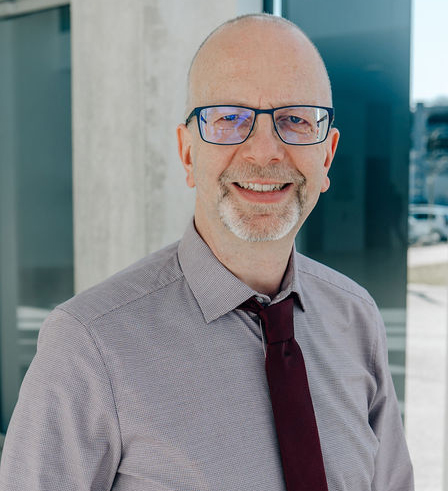Research profile
Research at DHBW Heidenheim is application and transfer-oriented in the fields of health, social work, technology and business. The principle of duality is reflected in the practical and scientific relevance of research.
Please contact our research manager Dr. Mirjam Folger for details on our R&D activities.
More information
- Research at the DHBW In becoming a university, the DHBW has acquired a mandate to perform research. This research is oriented toward applications and transfer in accordance with the principle of duality, typically in collaboration with corporate partners.
- Dock33 Co-working and maker space in Heidenheim
Reserch projects at the DHBW Heidenheim
EU4Dual
EU4Dual: DHBW is a European University
EU4Dual is a European university alliance - the only association of dual universities within the European Union. The aim of the alliance is to set quality standards for dual study programs in the EU. As a global reference for high-quality dual study programs, EU4Dual aims to promote dual study programs and intensify international exchange.
Together with eight other European universities, Baden-Württemberg Cooperative State University has also set itself the following goals:
- student mobility
- Teacher mobility
- Staff mobility
- Joint teaching and research projects
Contact: Brigitte Ilg, Head of Internationalisation at EU4DUAL; Lea Schmitt, Lead EU4Dual WP4
Duration: January 2023 bis December 2026
Project Website: https://eu4dual.education/
LCAMP
Learner Centric Advanced Manufacturing Platform for CoVEs (LCAMP, ERASMUS+)
The fifth industrial revolution is built upon the technologies of the fourth, with an increased emphasis on a human-centric, sustainable, and resilient industrial base, emphasising the digital and green transitions. A key pillar of this economic transformation is the role played by Advanced Manufacturing systems such as Robotics, 3D & 4D printing, artificial intelligence, and high-performance computing. I5.0, requires VET to develop 'learning centric approaches' that focus on the holistic competences of humans that plan, manage, oversee, or operate technologies. LCAMP will tackle this by incorporating a permanent European Platform of Vocational Excellence for Advanced Manufacturing, seeded from a consortium of 20 partners and over 50 associate organisations including leading VET/HVET centres, companies, regional government, R&D centres, associations of companies and clusters. By collaborating across borders, LCAMP’s goal is to support and empower regional AM CoVEs to become more resilient, innovative, and better equipped to train, upskill, and reskill young and adult students to successfully face the digital and green transitions. We will help regions grow and be more competitive through their VET systems. The Alliance is service-oriented, planning to establish permanent structures for: Teaching & Learning: establishing AM skills frameworks and curricula; launching or revising AM programmes (including micro-credentials); creating or capacity building learning factories (special AM labs, jointly run by VET and industry) Cooperation and Partnerships: launching a skills & jobs observatory for advanced manufacturing; accelerating industry/VET/region cooperation ideas via an open innovation community and providing consultancy to SMEs on integrating SME/VET connections. Governance & Funding: creating a one-stop-shop portal for all our services; ensuring a business case for continuing services to stakeholders in the long-term, while enhancing participation.
Contact: Prof. Dr.-Ing. Klaus-Dieter Rupp
Duration: September 2022 bis July 2025
Project website: https://lcamp.eu/
Laboratories
The DHBW Heidenheim is equipped with a range of laboratories that support teaching, as well as research, innovation, and transfer. Students use these laboratories to write their study theses, project theses, and bachelor theses. Research projects can also be implemented in collaboration with companies and institutes.
Obesity trainer
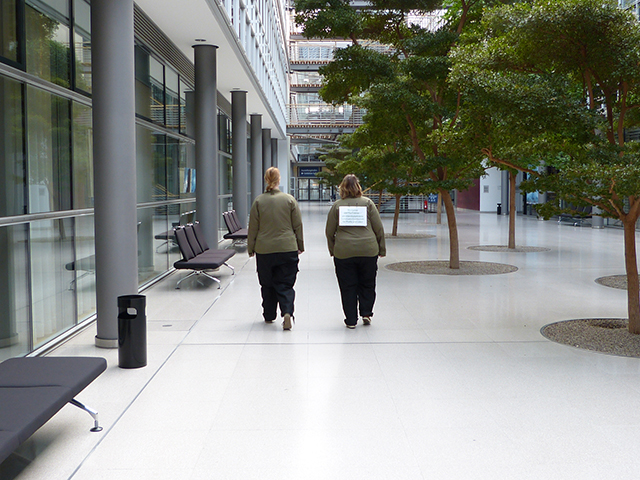
An increasing number of people are obese. This creates new challenges for medical and nursing care. The goal of the simulation is to address this health disorder from a scientifically valid basis to encourage reflection on personal positions, infrastructure and equipment in health care facilities, and to raise awareness of prevention and supportive health measures, while promoting empathy.
Age simulator
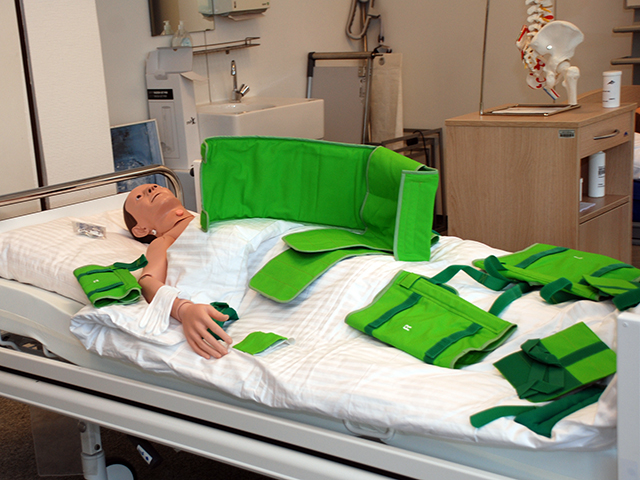
As people get older, their eyesight, hearing, grip, and walking abilities become diminished, as well as their mobility. But what does this mean exactly? The age simulator allows participants to experience everyday scenarios from the life of an elderly person. The goal is to address demographic change from a scientifically valid basis to encourage reflection on the bio-psycho-social sensitives of the elderly and raise awareness for this topic among a wide range of target groups.
Automation laboratory
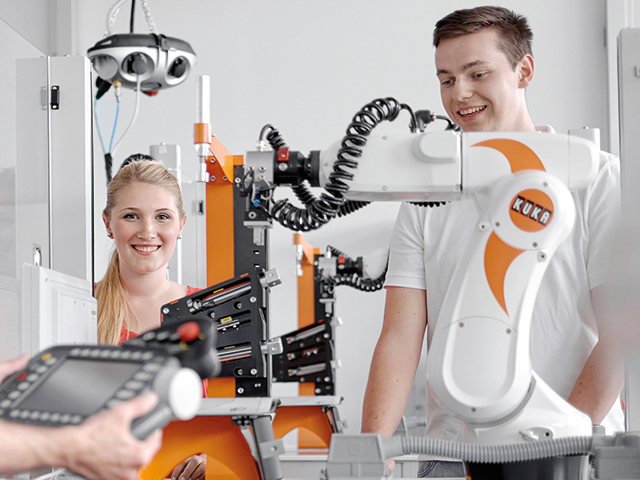
The automation laboratory of the DHBW Heidenheim is divided into two sections: two model systems of automated production lines by Festo Didactic and three robot training cells by Kuka.
AuReLia - Augmented Reality Learning & Accessibility
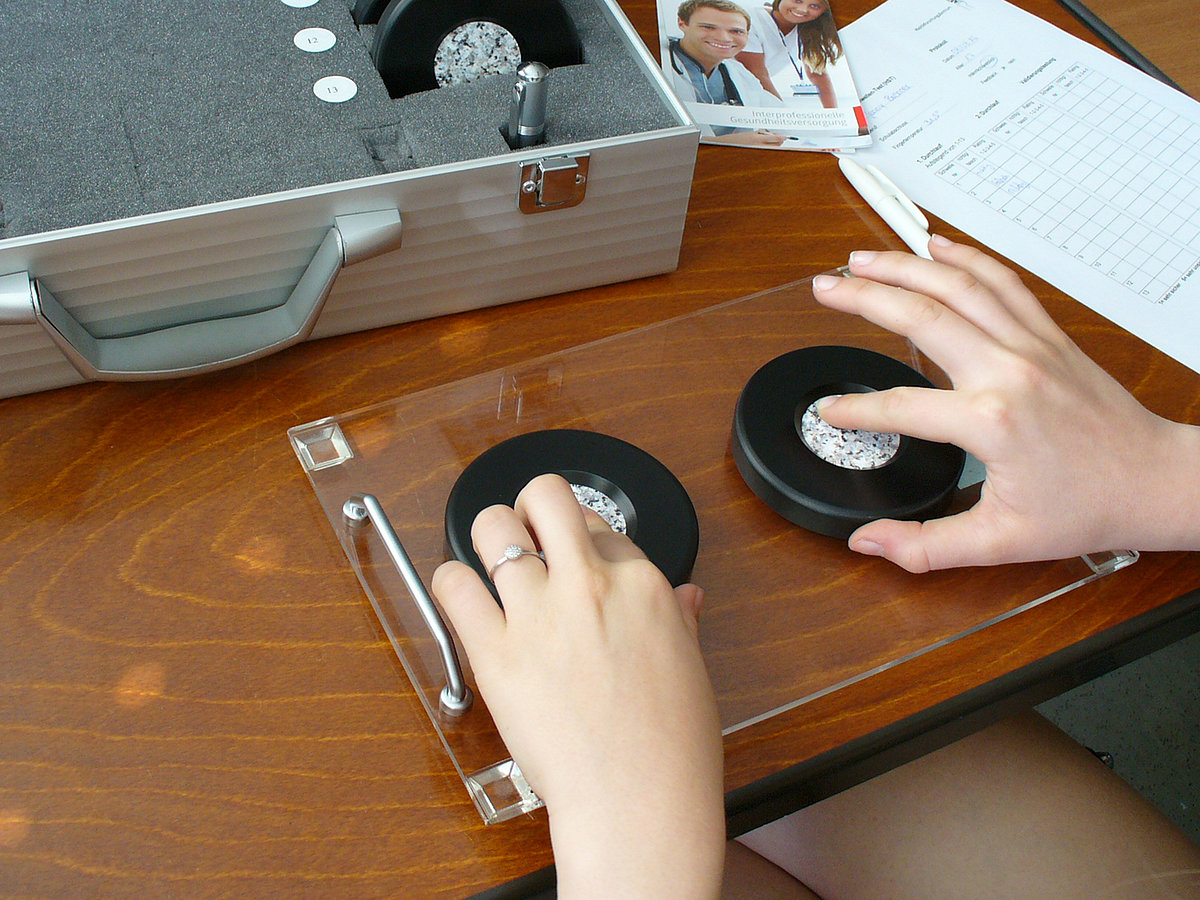
AuReLiA (Augmented Reality Learning Authoring) is the lab, combining development of augmented reality authoring with learning and open source software, researching open educational resources with great UX (user experience) available for learning for all.
CIM/CNC laboratory
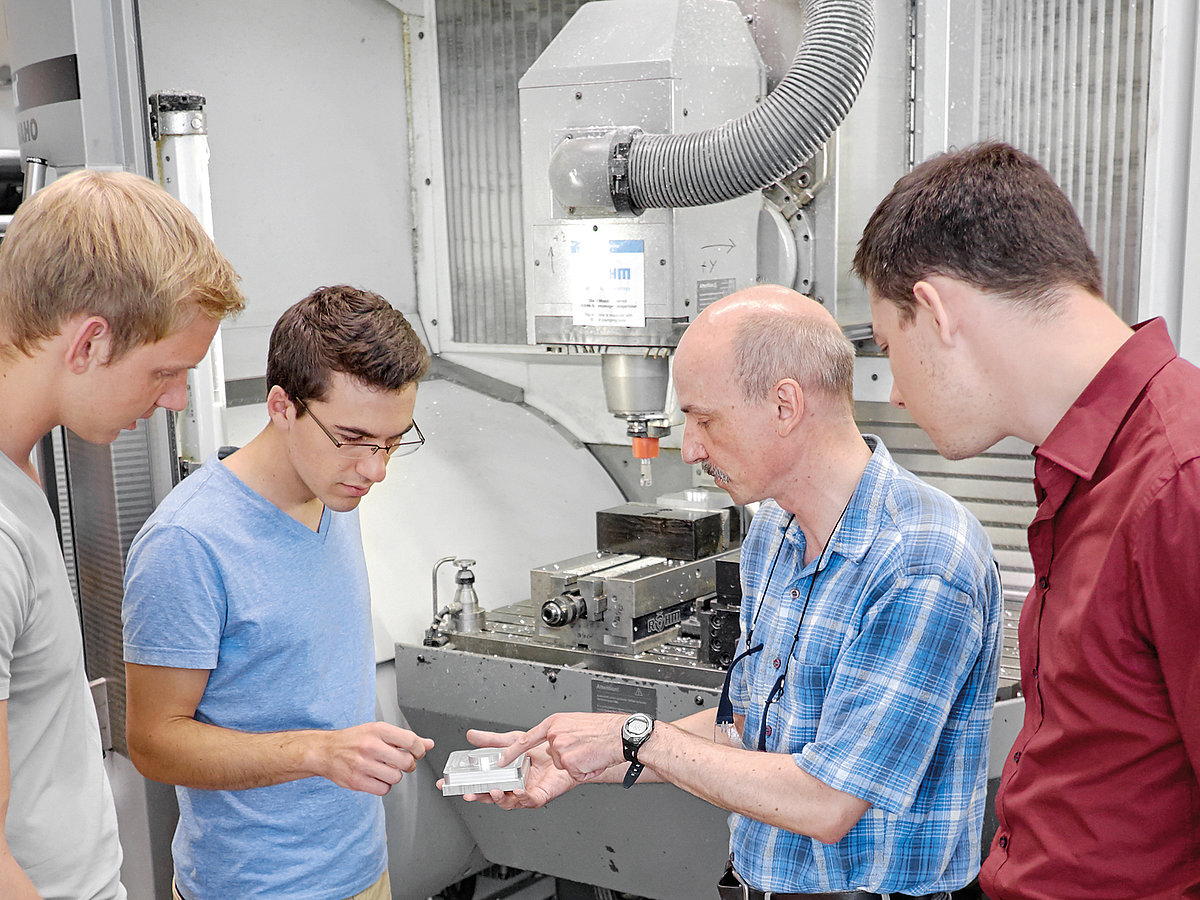
The CIM/CNC laboratory is equipped with a manufacturing workshop for CNC machining parts.
FabLab
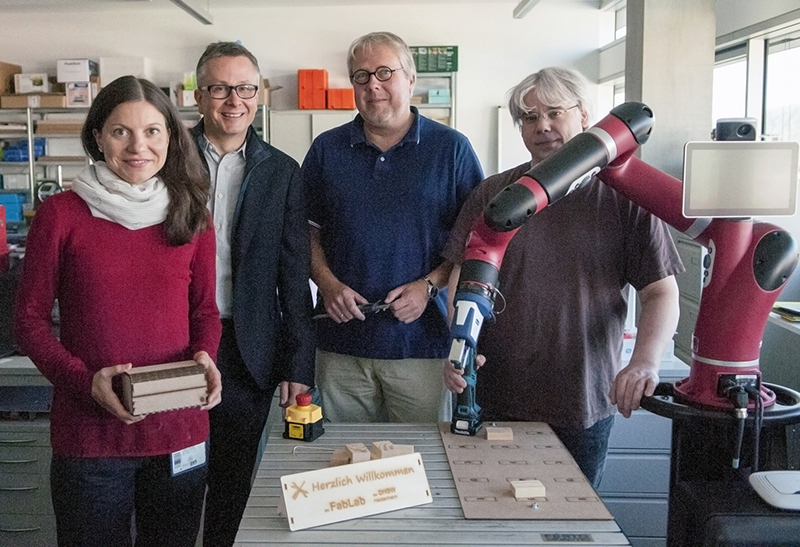
A FabLab is an open workshop that offers production facilities and modern industrial production techniques for manufacturing individual parts. A large variety of different materials can be processed using equipment such as 3D printers, laser cutters, soldering technology, and many other machines and tools.
Haptics laboratory

In their work, physical therapists use their sense of touch to look for tension and evaluate how joints feel by exploring them manually, for example to feel whether there are any spasticity changes in neurological patients. Among other projects, the haptics laboratory operates a specially developed and validated test and training system to measure the haptic threshold, namely the highest possible sensitivity of active tactile exploration.
Plastics laboratory
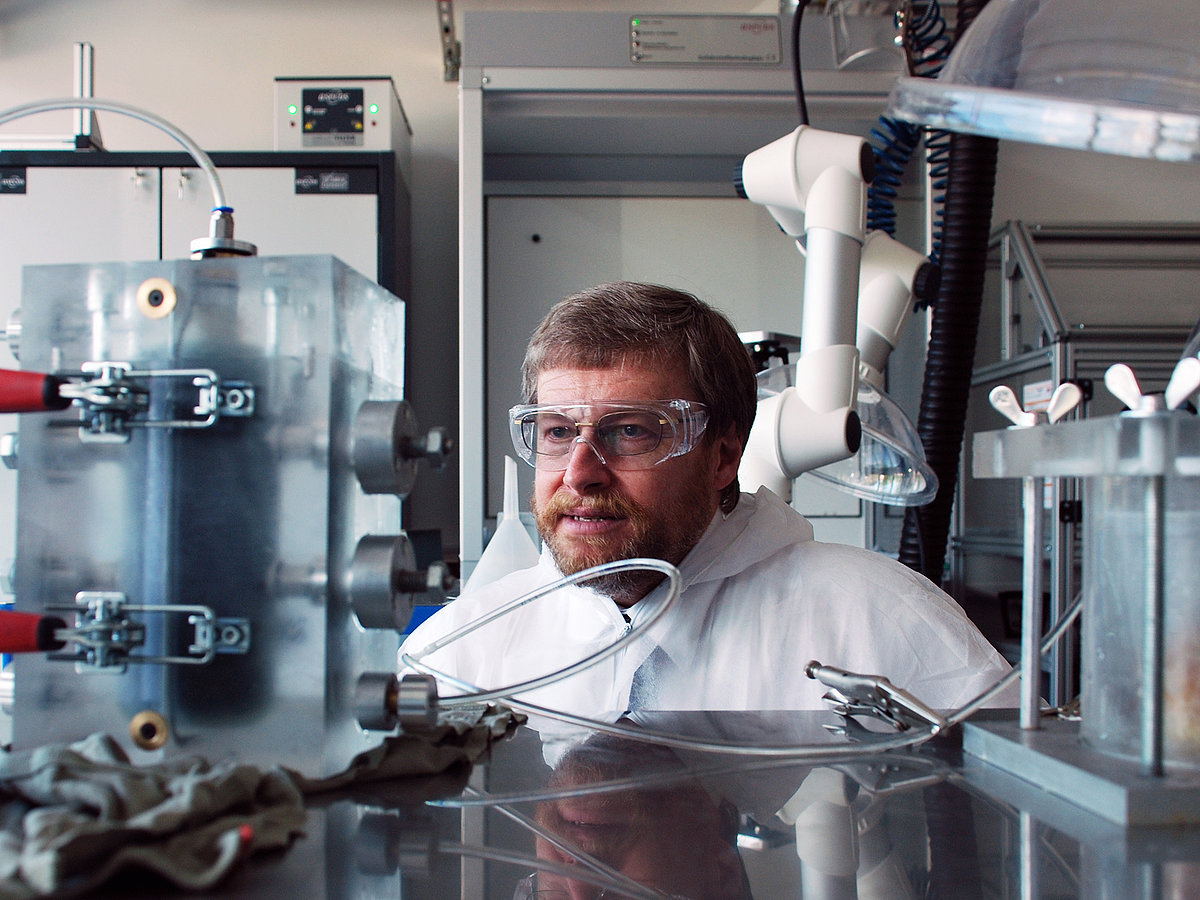
The plastics laboratory of the DHBW Heidenheim focuses on the use of various fiber-reinforced materials and the molds needed to manufacture parts. The typically small quantities of materials required for laboratory conditions often necessitate different procedures than series production, but the parts, resources, and processes must still satisfy the same quality requirements.
Laboratory for generative manufacturing processes (3D printing, rapid prototyping)
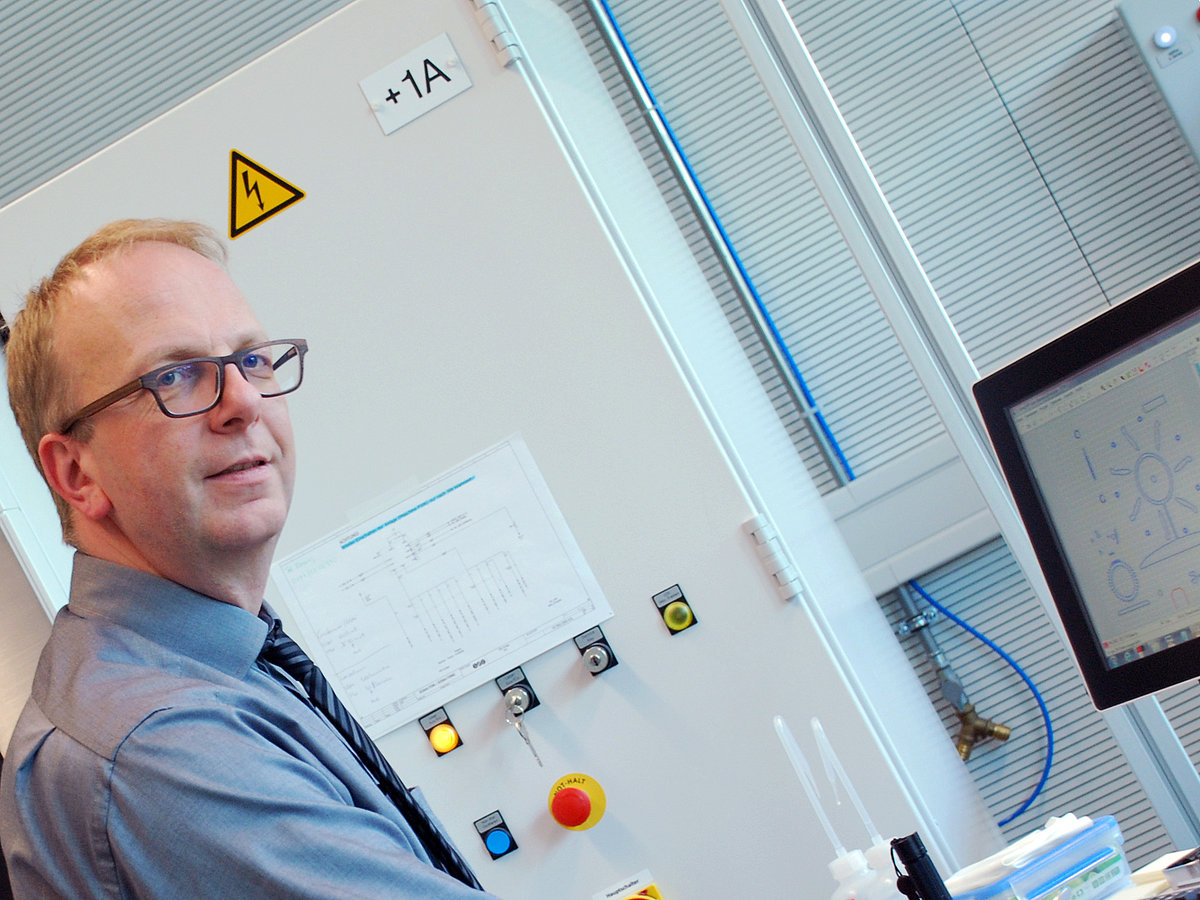
Generative manufacturing processes, also known as 3D printing or rapid prototyping, allow individual parts to be created without tools.
Laboratory for optical metrology
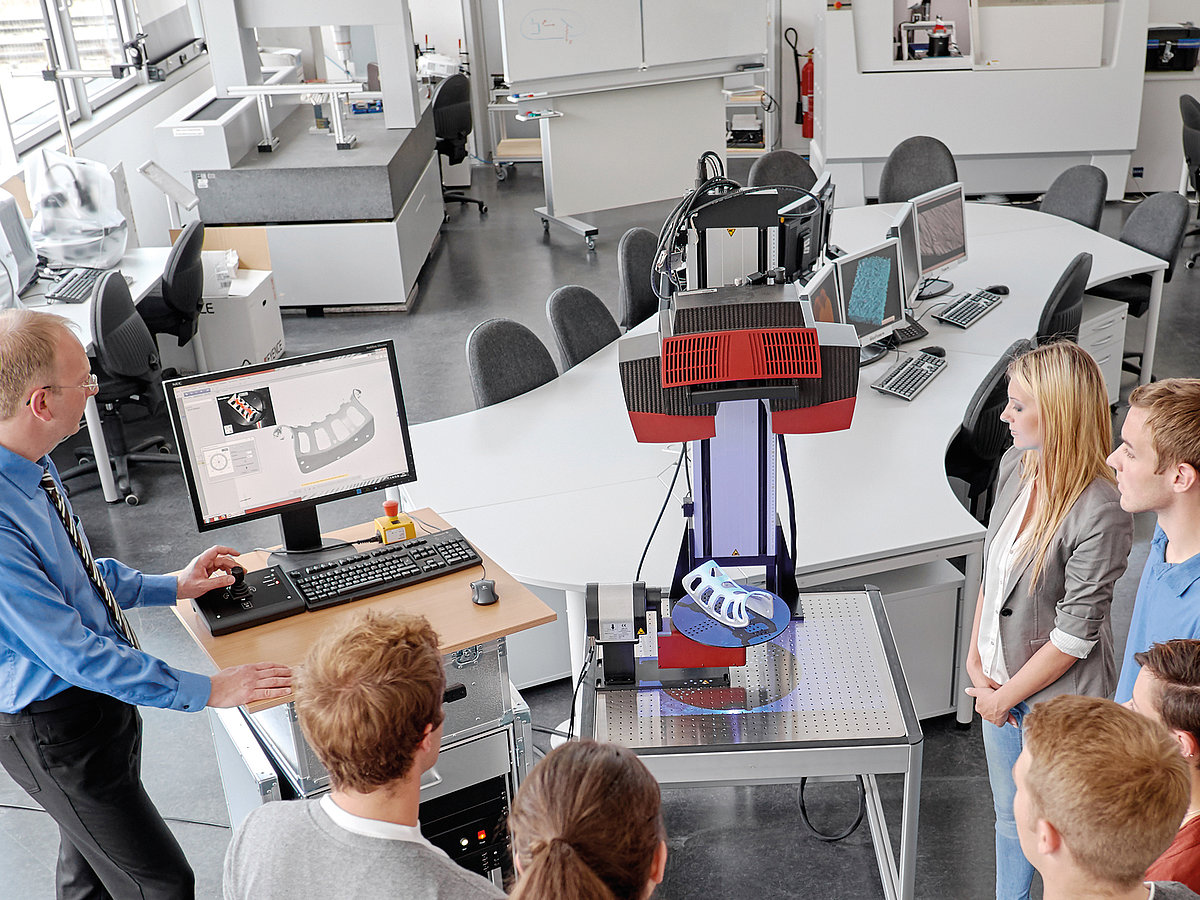
Optical scanners make it possible to measure and test the surface of objects of almost any size. In the laboratory for optical metrology of the DHBW Heidenheim, parts are digitized using an ATOS III strip projection scanner made by GOM mbH. This involves recording surfaces in three dimensions for subsequent analysis and evaluation to diagnose faults and assess the quality of the object.
Laboratory for scanning electron microscopy
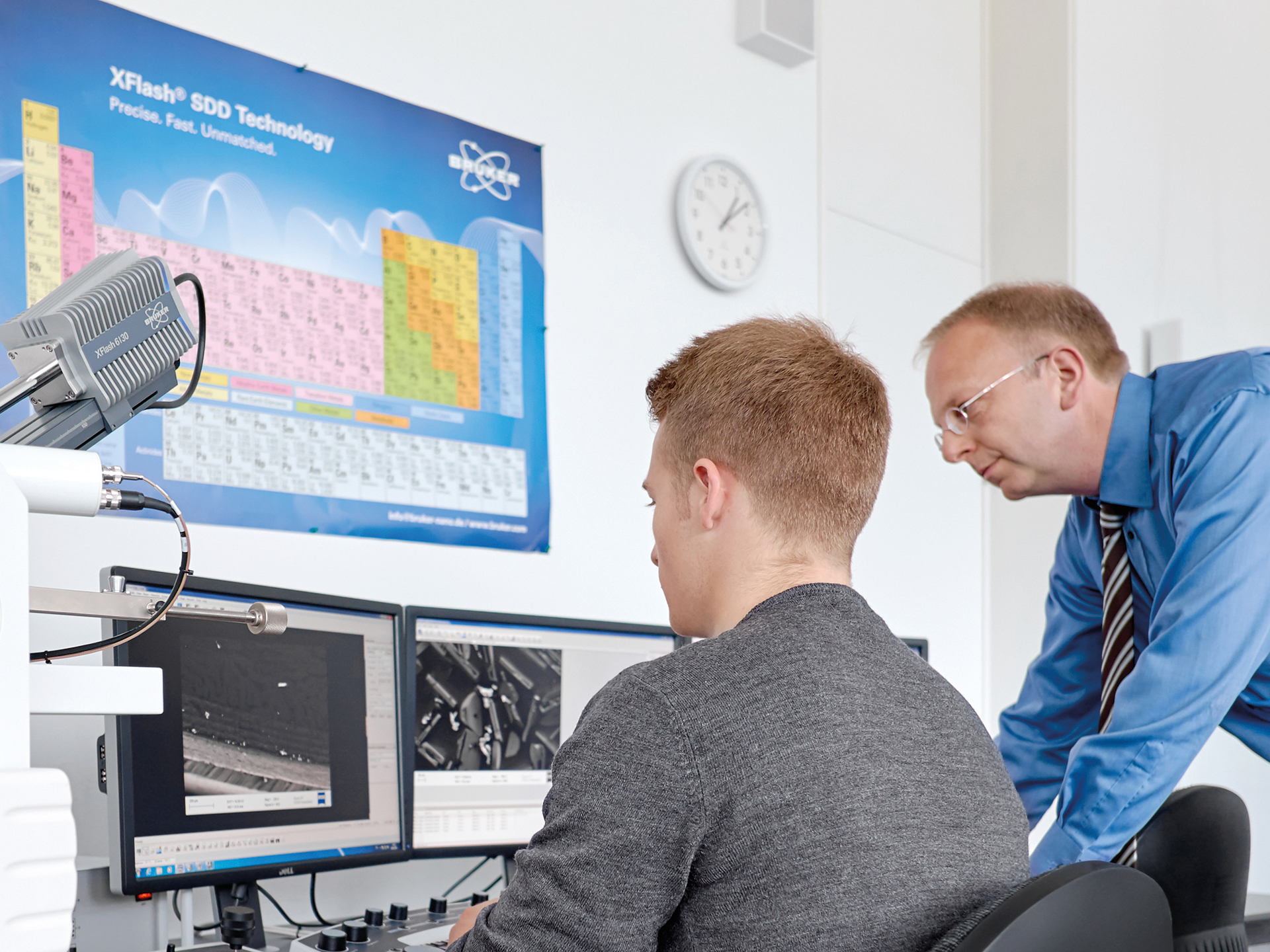
Scanning electron microscopy makes it possible to represent the surfaces of objects at higher magnifications and greater focus depth. The laboratory for scanning electron microscopy at the DHBW Heidenheim performs measurements, tests, and analyses of metallic, mineral, and biological samples.
Laboratory for non-destructive testing / industrial computed tomography
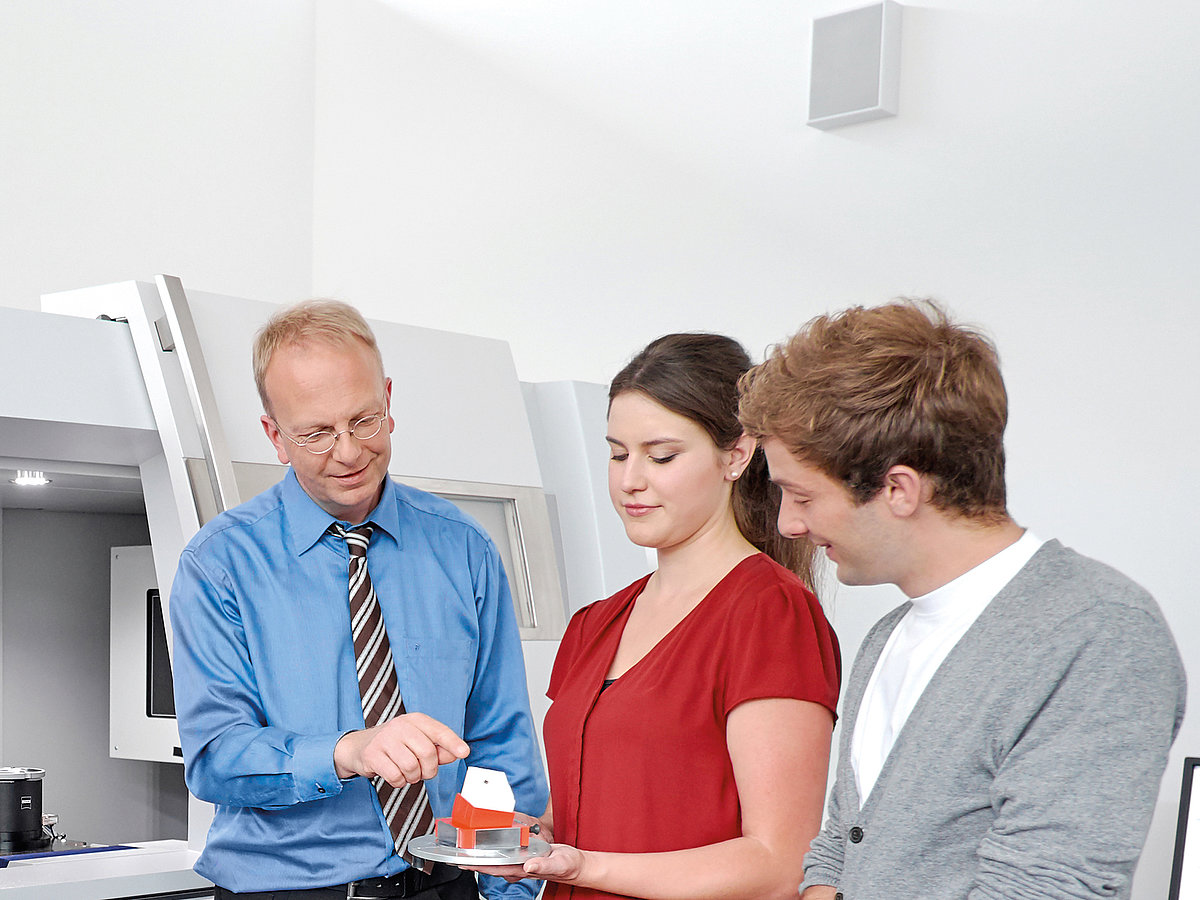
Non-destructive testing of objects with industrial computed tomography (iCT) makes it possible to visualize any complex, hidden, or even internal structures of parts. The laboratory for industrial computed tomography of the DHBW Heidenheim generates a three-dimensional dataset that allows a precise and high-resolution metrological analysis of parts and enables faults to be diagnosed.
Molecular biology laboratory
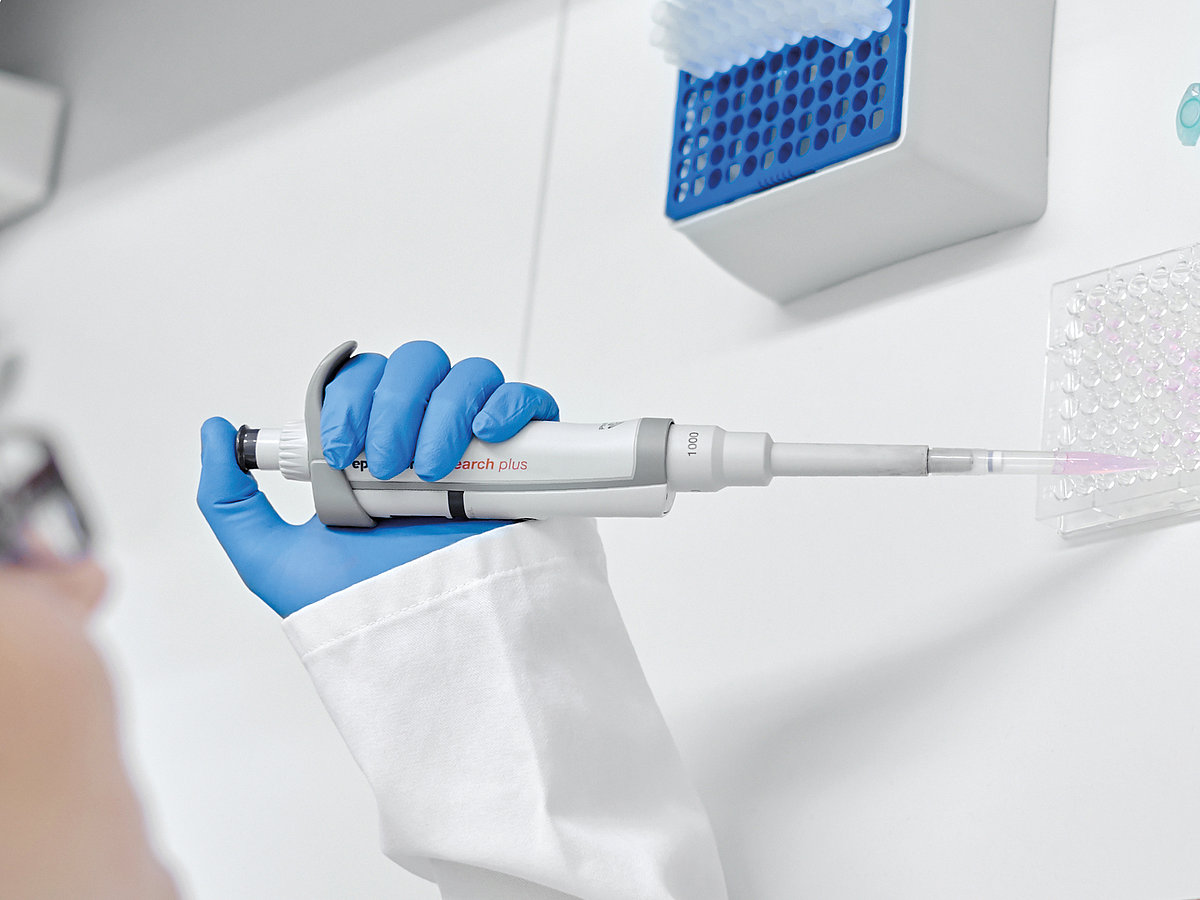
Molecular biology examines living phenomena at the molecular level. It studies the structure and function of biological macromolecules such as nucleic acids (DNA/RNA) and proteins. The molecular biology laboratory at the campus Ulm-Wiblingen allows students to perform molecular biology and genetic engineering work.
Simulationslabor am Gesundheitscampus Ulm-Wiblingen
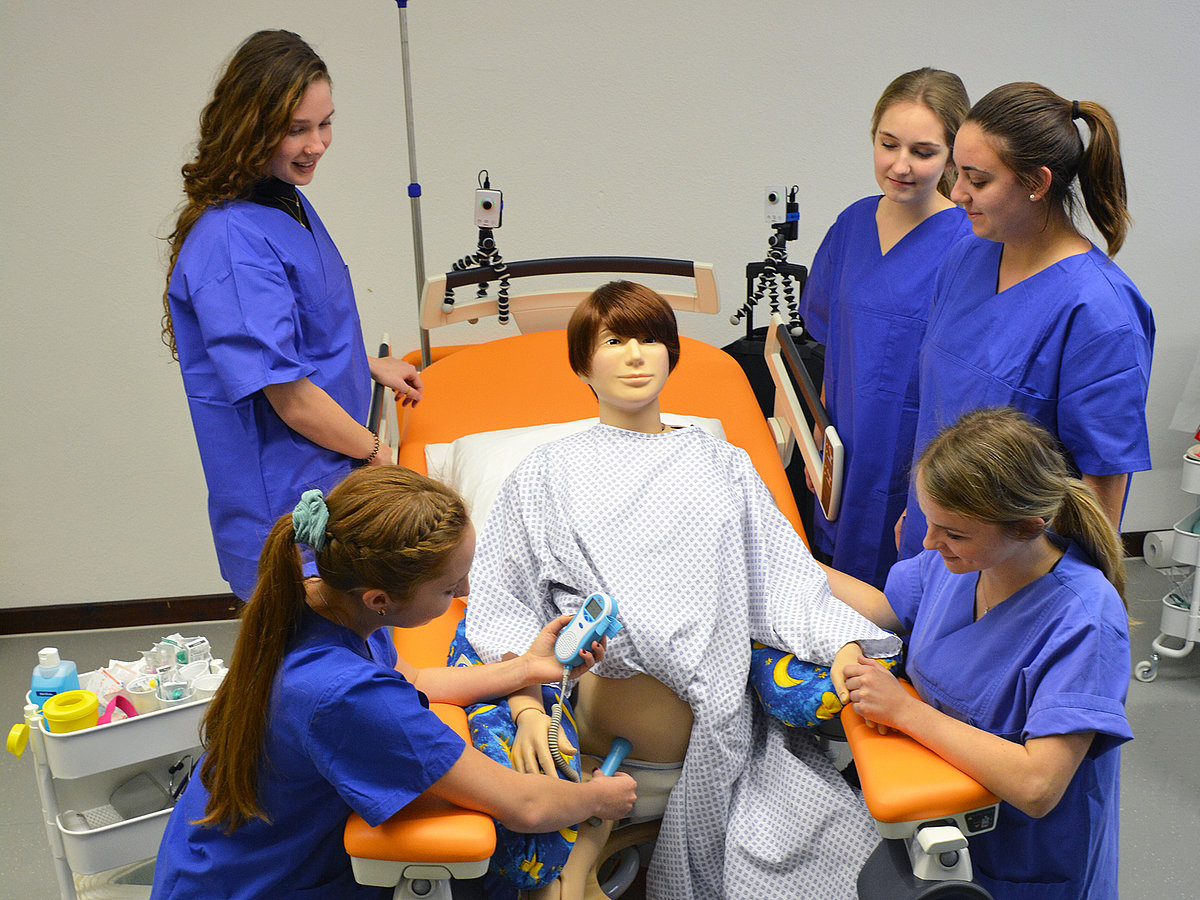
In the simulation laboratory ("SimLab") students of midwifery and nursing science practice critical events and complications that are rarely experienced in practice. The labs pursue the goal of optimizing the teaching and learning success of the students and at the same time guaranteeing a contemporary, practical and sustainable education.
User experience laboratory
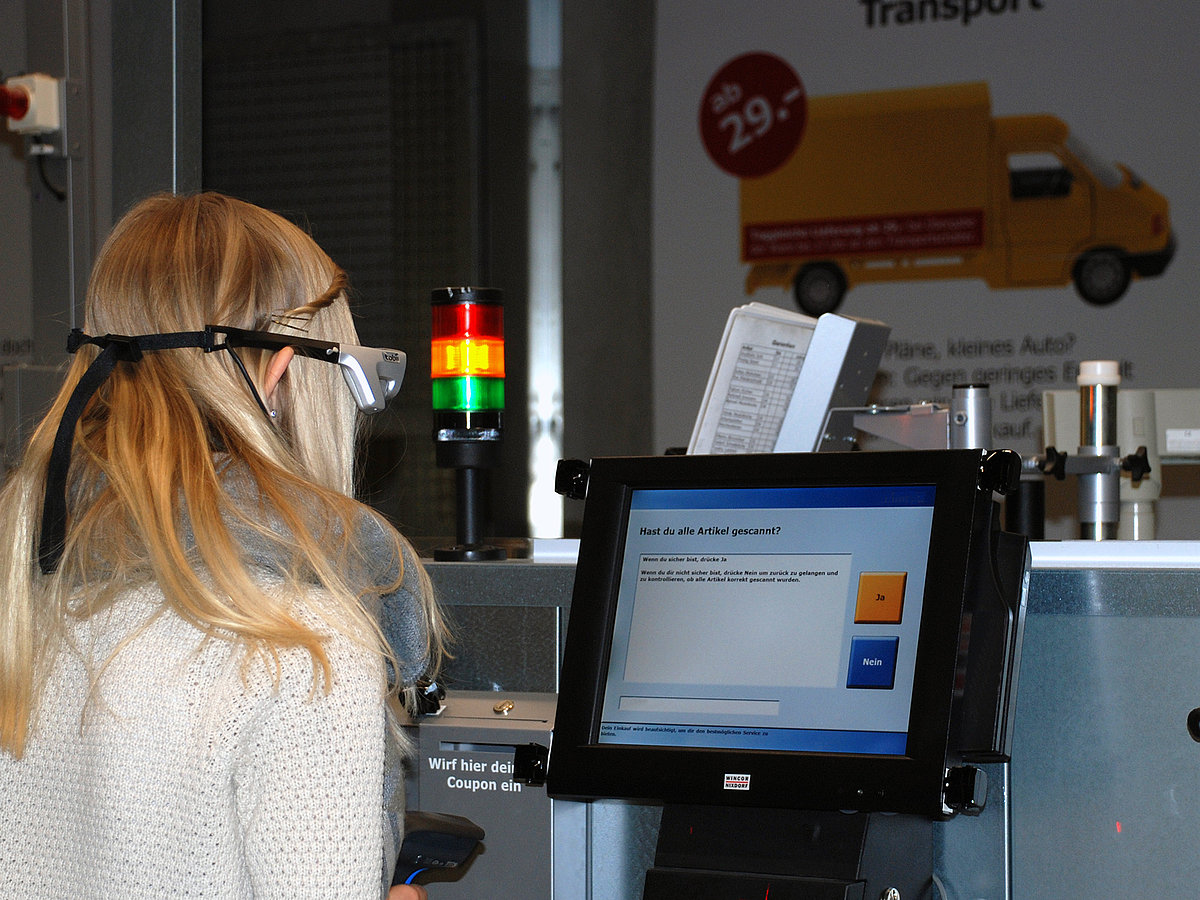
The user experience laboratory investigates new learning scenarios against the background of Industry 4.0 and conducts research projects in fields such as digital learning and automotive software. The best-known application is eye-tracking software, from the field of marketing. Another application involves studying user-friendly, experience-oriented designs for user interfaces in human-machine interactions.
Become a research partner
Due to the close cooperation with partner companies and public/social institutions, the Cooperative State University is in the unique position to apply academic knowledge to current problems of businesses and industry. Research partners have access to fundamental research as well as results from DHBW’s own research projects, thereby reaping the following benefits:
- Application- and needs-oriented solutions to your specific company problem
- Strengthening your capacity for innovation as well as problem-solving competence
- Quicker results by pooling know-how
- Esurance of quality results through scientifically sound support
- Creation of additional value for theory/teaching as well as regional economic development
Suitable to your needs and timeline, we can offer different forms of cooperation:
- third-party funded projects
- academic cooperative research project without funding
- contract research
If you are interested in a cooperation, please contact:
Folger, Mirjam, Dr.
Leiterin Forschung, Innovation und Transfer
Ansprechpartnerin Projekt StartUpSÜD
Hanns-Voith-Campus 1, Raum B2.02, 89518 Heidenheim
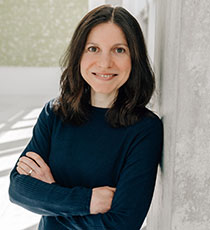
Marienstraße 20, Raum 624, 89518 Heidenheim
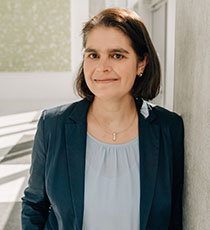
Institute
The Center for Market Research (CeMaRe) bundles the activities of different departments at DHBW Heidenheim in the field of market research. If needed, an interdisciplinary cooperation is pursued among the faculties of business administration, engineering, and social work.
CeMaRe supports students and lecturers in market research projects. These are carried out with the participation of dual partners or as independent research projects. Commercial research is not supported by CeMaRe.
DHBW is also expanding its strategic positioning and differentiation in the tertiary education sector in research. Due to its competence in the implementation of dual study programs and higher education and educational research, essential findings can be generated for the further development of the future-oriented study model. The continuous improvement of this study model requires scientific reflection, benchmarking with other forms of education and intensive scientific debate in all aspects of higher education. The stakeholders actively involved in the system, first and foremost students, dual partners, professors and university staff, as well as lecturers, enable a broad spectrum of target group-specific investigation opportunities, research questions and transfer potential. The DHBW synergetically bundles its competence in this institute for higher education and educational research in order to multiply the potentials of the previous approaches, laboratories and projects.
Website: https://www.dhbw.de/die-dhbw/einrichtungen-service/institut-fuer-hochschul-und-bildungsforschung
Become a research partner
Due to the close cooperation with partner companies and public/social institutions, the Cooperative State University is in the unique position to apply academic knowledge to current problems of businesses and industry. Research partners have access to fundamental research as well as results from DHBW’s own research projects, thereby reaping the following benefits:
- Application- and needs-oriented solutions to your specific company problem
- Strengthening your capacity for innovation as well as problem-solving competence
- Quicker results by pooling know-how
- Esurance of quality results through scientifically sound support
- Creation of additional value for theory/teaching as well as regional economic development
Suitable to your needs and timeline, we can offer different forms of cooperation:
- third-party funded projects
- academic cooperative research project without funding
- contract research
If you are interested in a cooperation, please contact:
Folger, Mirjam, Dr.
Leiterin Forschung, Innovation und Transfer
Ansprechpartnerin Projekt StartUpSÜD
Hanns-Voith-Campus 1, Raum B2.02, 89518 Heidenheim

Marienstraße 20, Raum 624, 89518 Heidenheim

Marketing research at the DHBW Heidenheim
Marienstraße 20, Raum 411, 89518 Heidenheim
- Telefon
- +49.7321.2722.221

Non-destructive testing and measurement technology
Marienstraße 20, Raum 113, 89518 Heidenheim
- Telefon
- +49.7321.2722.344
